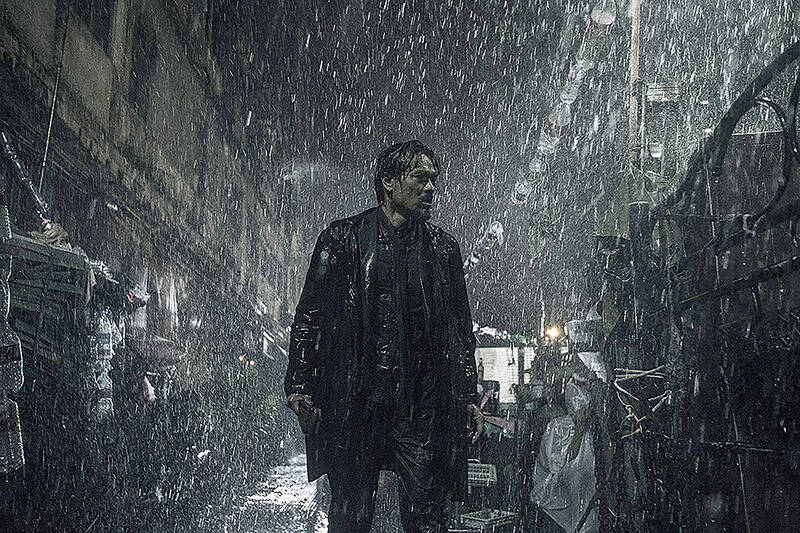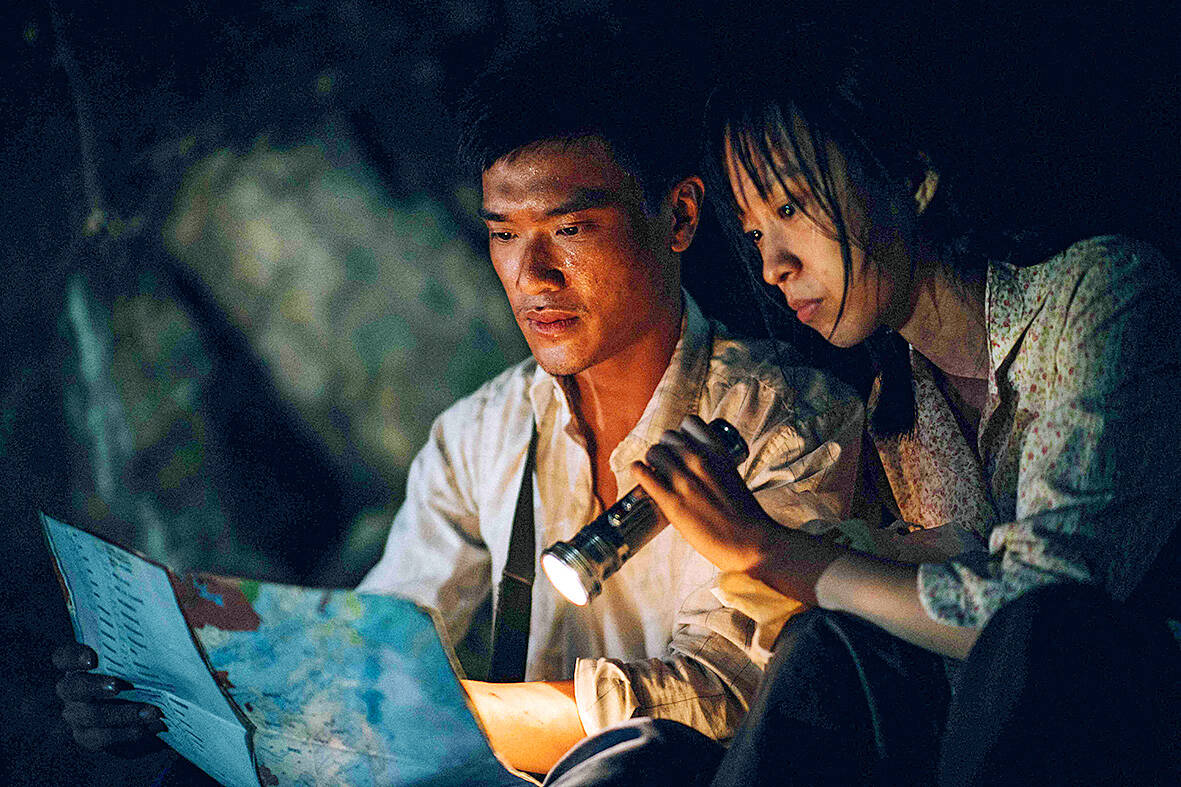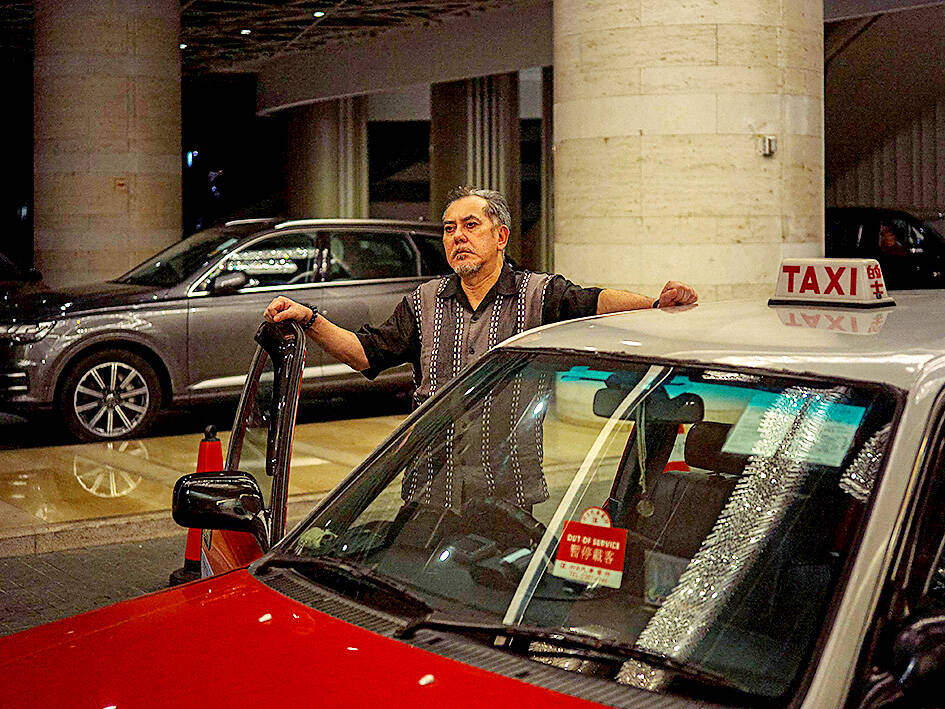Crime thriller Limbo leads the pack at the Golden Horse Film Awards in a strong showing for Hong Kong despite veiled warnings from Chinese authorities against joining the prestigious Taiwan-based event.
Dubbed the Chinese-language Oscars, Saturday’s Golden Horse awards are now in the fourth straight year without any mainstream Chinese films due to political tensions between Beijing and Taipei.
Most Chinese and Hong Kong A-listers who used to fill the red carpet have shunned the event after a Taiwanese director voiced support for the island’s independence in an acceptance speech in 2018.

Photo: AFP
China claims the self-ruled democratic island as part of its territory and has long blacklisted Taiwanese entertainers for any perceived support for independence.
There were no Chinese films in the 2019 nomination list and several Hong Kong movies dropped out that year, while big commercial productions were conspicuously absent at both the 2020 and 2021 awards.
This year marks something of a shift with seven Hong Kong films in the running, including five features and two documentaries, in what organizers described as “the best showing in five years” for the city.

Photo: AFP
Five indie works from China are also contending, although there is still no submission of a feature-length film or major commercial release.
‘THINK TWICE’
Just days before the nominations were announced in September, the Hong Kong Motion Picture Industry Association urged members to “think twice” about getting involved in the Golden Horse awards, describing them as “gradually politicized.”

Photo: AFP
Beijing’s Taiwan Affairs Office echoed that disapproval, saying it supported cultural exchanges with Taiwan but “for activities that have political overtones, it’s a different matter.”
Black-and-white crime noir Limbo, which has the most nods at 14, is vying for best picture against another Hong Kong drama The Sunny Side of the Street and three Taiwanese films.
But it is unclear if many of the Hong Kong or Chinese nominees will travel to Taipei.
Cya Liu (劉雅瑟), nominated for best actress in Limbo, has confirmed via her Hong Kong agency that she will not attend the ceremony, without giving any reasons.
“I think they want to win but in the current political environment it’s probably inevitable that neither the director nor the cast will be present” except for Taiwanese-American actor Mason Lee (李淳), film critic Wonder Weng said.
Mason Lee is the son of Oscar-winning Taiwanese director Ang Lee (李安), who is a staunch Golden Horse supporter and regularly chairs its jury, a role that is taken up by veteran Hong Kong director Ann Hui (許鞍華) this year.
“It would be really awkward... if a film that is recognized with 14 nominations does not appear to support, or even boycott” the event, said Weng of Taiwan’s Film Critics Society.
Soi Cheang (鄭保瑞), who is nominated for best director for Limbo, declined a request for comment.
‘A DOOR FOR INDIE FILM’
The Golden Horse awards have become a bulwark against Beijing’s tightening grip on creative freedoms and often showcase titles that would not get past censors in China and Hong Kong.
At last year’s awards, the best documentary prize went to Hong Kong director Kiwi Chow’s (周冠威) Revolution of Our Times.
The film explored the huge and sometimes violent democracy protests that swept the business hub in 2019 but cannot be shown there.
Once the crucible of Cantonese cinema and a bastion of free speech, Hong Kong is being transformed into a mirror of the authoritarian mainland after those protests.
A national security law has criminalized much dissent and film censorship powers have been strengthened.
Some of the Chinese films nominated this year also touch on sensitive subjects.
Short film Frontier explores the stereotyping and discrimination against China’s Uighur minority. Will You Look at Me (當我望向你的時候) is a documentary about homosexuality while Silence in the Dust (塵默呼吸) focuses on laborers suffering from industrial pollution.
“Some say the Golden Horse may become less influential with fewer big movies submitting but I think it’s crucial that... it opens a door for these independent films,” said commentator Weng.
“It is the only outlet for their voices to be heard” in Chinese-language film festivals and awards, he added. Hong Konger Chan Tze-woon’s (陳梓桓) Blue Island (憂鬱之島) is nominated for best documentary. It focuses on the city’s democracy movement and what he calls “a desperate attempt to capture the final moments of a sinking island.”
“I hope more people will know about the film after it’s nominated, and that it will let more people continue to discuss Hong Kong,” said Chan, who said he plans to attend Saturday’s ceremony.
“I also hope the nomination will encourage more filmmakers to keep making free films,” he said.

When the weather is too cold to enjoy the white beaches and blue waters of Pingtung County’s Kenting (墾丁), it’s the perfect time to head up into the hills and enjoy a different part of the national park. In the highlands above the bustling beach resorts, a simple set of trails treats visitors to lush forest, rocky peaks, billowing grassland and a spectacular bird’s-eye view of the coast. The rolling hills beyond Hengchun Township (恆春) in Pingtung County offer a two-hour through-hike of sweeping views from the mighty peak of Dajianshih Mountain (大尖石山) to Eluanbi Lighthouse (鵝鑾鼻燈塔) on the coast, or

Charges have formally been brought in Taiwan People’s Party (TPP) Chairman Ko Wen-je’s (柯文哲) bribery, corruption and embezzling of campaign funds cases. Ko was briefly released on bail by the Taipei District Court on Friday, but the High Court on Sunday reversed the decision. Then, the Taipei District Court on the same day granted him bail again. The ball is in dueling courts. While preparing for a “year ahead” column and reviewing a Formosa poll from last month, it’s clear that the TPP’s demographics are shifting, and there are some indications of where support for the party is heading. YOUNG, MALE

Her greatest fear, dormant for decades, came rushing back in an instant: had she adopted and raised a kidnapped child? Peg Reif’s daughter, adopted from South Korea in the 1980s, had sent her a link to a documentary detailing how the system that made their family was rife with fraud: documents falsified, babies switched, children snatched off the street and sent abroad. Reif wept. She was among more than 120 who contacted The Associated Press this fall, after a series of stories and a documentary made with Frontline exposed how Korea created a baby pipeline, designed to ship children abroad as quickly as

Taiwanese persimmon farmer Lo Chih-neng stands on a ladder in his sprawling orchard using pruning sheers to cut the golden-yellow fruit still hanging from branches after enduring a tough season. Persimmons are popular in Taiwan where people travel hours to buy bags and boxes of the sweet dried fruit to take home to their families or give away to friends. But changing weather and an aging population are posing a threat to the century-old industry, forcing some farmers to look at alternative ways to maximize returns — or get out altogether. Lo’s harvest was down by more than a third last year, the